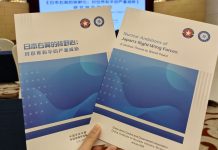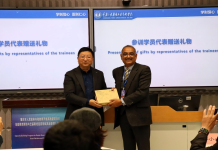BEIJING: The Beijing Institute of Technology recently received 500 milligrams of the lunar samples brought back by the Chang’e 5 mission.
BIT’s research team will study the material characteristics of these samples and related manufacturing technology, with the building of a future lunar research station in mind. Shen Jun, a professor with the School of Mechanical Engineering at BIT, noted that both international and domestic plans have been laid out for the construction of lunar research stations, and her team will focus on related preliminary research.
“Building a lunar research station is like building a house on the moon. Due to current rocket carrying capacity limitations and the high cost of transportation between the Earth and the moon, it is essential to make use of indigenous materials on the moon during lunar research station construction. That means lunar soil will serve as the main material,” Shen said. The professor said that the scientific research is scheduled to be conducted in two phases. First, the basic physical properties of the samples, including optical and electromagnetic features, will be studied.
Then, the team will explore lunar soil particle surface properties, and search for the most suitable 3D printing techniques and materials that can be printed in appropriate shapes when mixed with lunar soil.
“If we compare lunar soil to cement, what we will do first is study the characteristics of the cement, then find suitable materials such as sand and adhesives for mixing with the cement, and ultimately ensure that we have the technology to make bricks from the cement and sand mixture,” Shen added.
Lunar soil molding technology faces a slew of challenges such as material compatibility, mixture stability and printing reliability.
The lunar samples will not be used for the construction experiments. Instead, the team plans to develop simulated lunar soil with existing materials on Earth and continuously optimize the development methods and construction techniques based on analysis data from the lunar samples. “BIT will make full use of these valuable lunar samples and is committed to providing a theoretical basis and technical support for the future construction of lunar research stations,” said Zhang Jun, an academician of the Chinese Academy of Engineering and Party chief of BIT. –The Daily Mail-China Daily news exchange item






